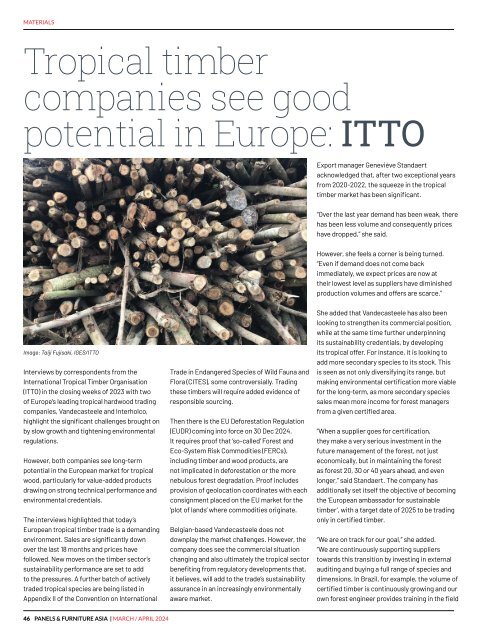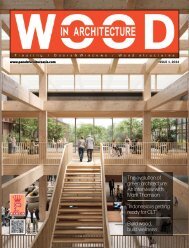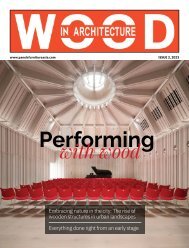Panels & Furniture Asia March/April 2024
Panels & Furniture Asia (PFA) is a leading regional trade magazine dedicated to the woodbased panel, furniture and flooring processing industry. Published bi-monthly since 2000, PFA delivers authentic journalism to cover the latest news, technology, machinery, projects, products and trade events throughout the sector. With a hardcopy and digital readership comprising manufacturers, designers and specifiers, among others, PFA is the platform of choice for connecting brands across the global woodworking landscape.
Panels & Furniture Asia (PFA) is a leading regional trade magazine dedicated to the woodbased panel, furniture and flooring processing industry. Published bi-monthly since 2000, PFA delivers authentic journalism to cover the latest news, technology, machinery, projects, products and trade events throughout the sector. With a hardcopy and digital readership comprising manufacturers, designers and specifiers, among others, PFA is the platform of choice for connecting brands across the global woodworking landscape.
Create successful ePaper yourself
Turn your PDF publications into a flip-book with our unique Google optimized e-Paper software.
MATERIALS<br />
Tropical timber<br />
companies see good<br />
potential in Europe: ITTO<br />
Export manager Geneviève Standaert<br />
acknowledged that, after two exceptional years<br />
from 2020-2022, the squeeze in the tropical<br />
timber market has been significant.<br />
“Over the last year demand has been weak, there<br />
has been less volume and consequently prices<br />
have dropped,” she said.<br />
However, she feels a corner is being turned.<br />
“Even if demand does not come back<br />
immediately, we expect prices are now at<br />
their lowest level as suppliers have diminished<br />
production volumes and offers are scarce.”<br />
Image: Taiji Fujisaki, IGES/ITTO<br />
Interviews by correspondents from the<br />
International Tropical Timber Organisation<br />
(ITTO) in the closing weeks of 2023 with two<br />
of Europe’s leading tropical hardwood trading<br />
companies, Vandecasteele and Interholco,<br />
highlight the significant challenges brought on<br />
by slow growth and tightening environmental<br />
regulations.<br />
However, both companies see long-term<br />
potential in the European market for tropical<br />
wood, particularly for value-added products<br />
drawing on strong technical performance and<br />
environmental credentials.<br />
The interviews highlighted that today’s<br />
European tropical timber trade is a demanding<br />
environment. Sales are significantly down<br />
over the last 18 months and prices have<br />
followed. New moves on the timber sector’s<br />
sustainability performance are set to add<br />
to the pressures. A further batch of actively<br />
traded tropical species are being listed in<br />
Appendix II of the Convention on International<br />
Trade in Endangered Species of Wild Fauna and<br />
Flora (CITES), some controversially. Trading<br />
these timbers will require added evidence of<br />
responsible sourcing.<br />
Then there is the EU Deforestation Regulation<br />
(EUDR) coming into force on 30 Dec <strong>2024</strong>.<br />
It requires proof that ‘so-called’ Forest and<br />
Eco-System Risk Commodities (FERCs),<br />
including timber and wood products, are<br />
not implicated in deforestation or the more<br />
nebulous forest degradation. Proof includes<br />
provision of geolocation coordinates with each<br />
consignment placed on the EU market for the<br />
‘plot of lands’ where commodities originate.<br />
Belgian-based Vandecasteele does not<br />
downplay the market challenges. However, the<br />
company does see the commercial situation<br />
changing and also ultimately the tropical sector<br />
benefiting from regulatory developments that,<br />
it believes, will add to the trade’s sustainability<br />
assurance in an increasingly environmentally<br />
aware market.<br />
She added that Vandecasteele has also been<br />
looking to strengthen its commercial position,<br />
while at the same time further underpinning<br />
its sustainability credentials, by developing<br />
its tropical offer. For instance, it is looking to<br />
add more secondary species to its stock. This<br />
is seen as not only diversifying its range, but<br />
making environmental certification more viable<br />
for the long-term, as more secondary species<br />
sales mean more income for forest managers<br />
from a given certified area.<br />
“When a supplier goes for certification,<br />
they make a very serious investment in the<br />
future management of the forest, not just<br />
economically, but in maintaining the forest<br />
as forest 20, 30 or 40 years ahead, and even<br />
longer,” said Standaert. The company has<br />
additionally set itself the objective of becoming<br />
the ‘European ambassador for sustainable<br />
timber’, with a target date of 2025 to be trading<br />
only in certified timber.<br />
“We are on track for our goal,” she added.<br />
“We are continuously supporting suppliers<br />
towards this transition by investing in external<br />
auditing and buying a full range of species and<br />
dimensions. In Brazil, for example, the volume of<br />
certified timber is continuously growing and our<br />
own forest engineer provides training in the field<br />
46 PANELS & FURNITURE ASIA | MARCH / APRIL <strong>2024</strong>

















